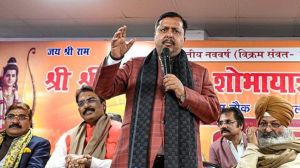EBCs? Quite untenable
When the Mandal Commission submitted its Report in 1980, B.P. Mandal told me, 8220;Mr Gill, I know how much work you have put in as secreta...

When the Mandal Commission submitted its Report in 1980, B.P. Mandal told me, 8220;Mr Gill, I know how much work you have put in as secretary of the Commission. But let me tell you that today we have performed the immersion ceremony of our Report.8221; For the next 10 years the Report gathered dust. Then , lo and behold, V.P. Singh unleashed it and it has been on a rampage ever since. Now we seem to be moving to a situation when almost all government jobs could get reserved. The recent Cabinet decision to reserve jobs for the economically backward classes EBCs will certainly take us close to this.
The first job reservations were made when Article 15 of the Constitution was amended in 1951, stipulating that the state may 8220;make special provision for the advancement of any socially and educationally backward classes of citizens or for the Scheduled Castes and the Scheduled Tribes8221;. It was under this provision that jobs proportionate to the population of SCs and STs, ie, 15.05 and 7.51 per cent respectively, were reserved for them. Nearly 40 years later, 27 per cent more jobs were reserved for Other Backward Classes OBCs when the Mandal Commission8217;s report was accepted by the government. This time the reservation was not made in proportion to the population of OBCs, which worked out to 52 per cent. Why? The obstacle was a 1963 Supreme Court judgement in the Balaji vs State of Mysore case, which laid down, 8220;Speaking generally and in a broad way, a special provision should be less than 50 per cent8221;. As 22.56 per cent reservation had already been made for SCs/STs, the Commission topped this figure by 27 per cent only, so that the aggregate of reserved posts remained just 0.44 per cent below the stipulation.
What will be the implications of the latest move? First, under the existing Constitutional provisions, 8220;economic backwardness8221; is not a category for which jobs can be reserved. It would, therefore, require a constitutional amendment. But since any opposition to such a populist move is unlikely, it would be easy to effect such an amendment. The second hurdle is more difficult. How do you define an 8216;economically backward8217; person in a country of rampant poverty? The Scheduled Castes, or Dalits, have their identity almost stamped on their foreheads. The Scheduled Tribes are forest dwellers and have a distinct lifestyle. OBCs are Sudras and their identity also does not change over the generations. But there is no such fixity about economic backwardness. A person who is a pauper today may become rich tomorrow. Also, the government will have to fix a cut off point for economic backwardness and the aspiring beneficiary will have to obtain a certificate from a local official, which will open another lucrative avenue for corruption.
Most importantly, since Independence the government has spent lakhs of crores on implementing development programmes to ostensibly remove poverty. It is also a fact that the poverty-line has almost halved over the years. There was a case for extending special concessions to those who were historically discriminated against, but people bearing no such cross are benefiting from these schemes as much as the depressed classes, and there is no point in now placing them in a separate category for special treatment. It is not widely known that the percentage of upper castes is only 17.5 per cent but they occupy most of the senior positions in the civil and military services. When we talk of the burgeoning middle class, it is mainly a big chunk this section that is referred to. How far would it serve the ends of social justice if reservations are made for a segment of this most well-off section?
Job reservation for the EBCs is not going to be the end of this business. There have been repeated demands from various quarters that jobs for various categories of backwards should be reserved in the private sector. If this happens, you can forget all about India becoming an Asian economic giant like China. We now get so ecstatic talking about an export target of 50 billion per year by 2008 by our computer software industry. But if you make it obligatory for TCS, Wipro and Infosys that more than half of their employees should belong to the reserved categories, you may not only forget all about achieving this target, but also see these companies going down the tube.
Populism is an integral part of democracy, and all governments distribute patronage to curry favour. But the government should also give some thought to the imperatives of excellence for progress. With liberalisation we have entered a highly competitive environment, and unless we have some scope for competitive excellence, how will we survive? To remove poverty, what we need is not redistribution of the existing jobs, but the creation of new ones. We need to think about how we are to achieve this.
- 01
- 02
- 03
- 04
- 05































